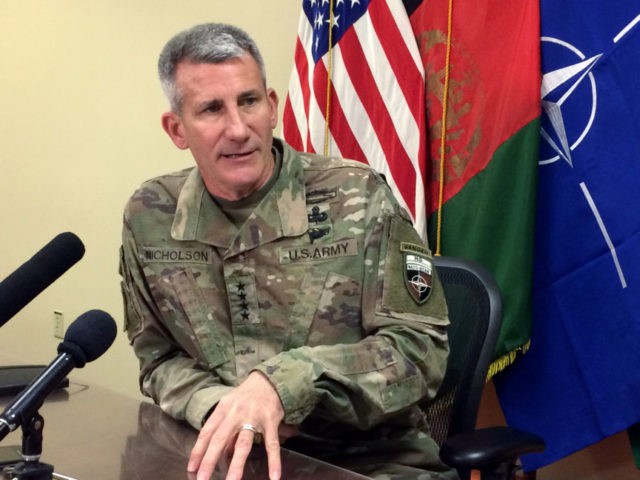The United States has deemed protecting the sprawling Afghan capital of Kabul the “main effort” of an intensified U.S.-backed offensive following a series of high-profile terrorist assaults at the hands of the Taliban and the Islamic State (ISIS/ISIL), revealed the top commander of American and NATO forces in Afghanistan.
“Kabul is our main effort. To harden Kabul, to protect the people of Kabul and the international community that are here … the Taliban are in the city. So this is a process of deliberately clearing sections of the city. That’s begun,” U.S. Gen. John Nicholson, the top American commander in Afghanistan, told reporters on Wednesday.
Afghanistan’s TOLO news notes:
A group of newly arriving U.S. Army advisers would partner with some of the Afghan troops securing Kabul. Commandos would carry out intelligence-driven raids throughout the city, something Nicholson said was already ongoing.
The goal would be to eliminate Taliban strongholds as well as Taliban facilitators, which included criminal enterprises that, for a price, gave the insurgents shelter or weapons.
Kabul is home to several embassies from across the world.
U.S. President Donald Trump’s administration has intensified military operations in Afghanistan in response to the deteriorating security conditions he inherited from his predecessor, increasing the presence of American combat advisers and airstrikes.
Gen. Nicholson conceded that Kabul’s significant growth from an estimated 500,000 inhabitants in 2001 to about 5 million today had rendered the capital challenging to secure.
U.S. intelligence agencies are reportedly working with the Afghan National Defense and Security Forces (ANDSF), which includes police and army units, to better establish barriers and checkpoints across the city.
“I’ll just be very candid. We have a lot of work to do,” acknowledged Gen. Nicholson nearly 17 years after the U.S. began operations in Afghanistan.
“This growth at that rate has meant that there’s a lot of sprawl. It’s easy to get in and out of the city,” he added.
The general’s comments follow a recent spate of Taliban and ISIS-claimed attacks that reportedly killed nearly 200 people, mainly in and around Kabul over a period of one month.
One attack in Kabul alone killed more than 100 people in May 2017 near the German embassy.
No group claimed responsibility, but U.S. and Afghan officials designated the Taliban- and al-Qaeda-linked Haqqani Network as the culprit.
According to the Pentagon, the Haqqani Network poses the “greatest threat” against the United States military and its allies in Afghanistan.
Early this year, the Afghan government published what it described as “undeniable” proof that neighboring Pakistan continues to facilitate attacks by the Taliban and the Haqqani Network in Afghanistan, including in Kabul.
President Trump suspended an estimated $2 billion in security assistance to Pakistan over Islamabad’s refusal to take decisive action against the Taliban and the Haqqani Network.
U.S. Gen. Joseph Votel, the head of U.S. Central Command (CENTCOM) that oversees military operations in Afghanistan, told lawmakers this week that Pakistan continues to lend support to jihadists.
Gen. Nicholson’s remarks about protecting Kabul also come soon after U.S.-backed Afghan President Ashraf Ghani offered the Taliban a ceasefire and political legitimacy.
Reconciliation between Kabul and the Afghan Taliban is a major tenet of Trump’s strategy to end the war, which began in October 2001.
Although the Taliban has been largely silent on Ghani’s proposal, U.S. Secretary of Defense Jim Mattis recently said that some elements within the terrorist groups are receptive to the offer.
Nicholson spoke to reporters during Mattis unannounced visit to Kabul this week.
Echoing the Pentagon chief, Nicholson said:
What you don’t see in the news of course is all the backchannel communication that’s going on at multiple levels, through the Gulf, from the Taliban leadership through various means, and so forth. So there’s definitely an increase in the dialogue and the communication between the sides about reconciliation. And more than I’ve seen in any of the previous times I’ve been around this.
In November 2017, Gen. Nicholson said, “the Taliban cannot win. Their choices are to reconcile, live in irrelevance, or die.”

COMMENTS
Please let us know if you're having issues with commenting.